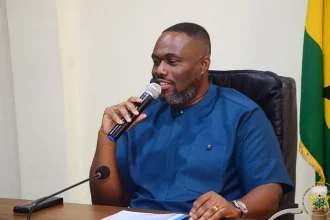The Police are calling on authorities to critically lay a solid foundation before attempting to review the law that forbids the use of motorcycles popularly referred to as ‘okada’ for commercial purposes.
According to the service, key steps such as the establishment of an institution to train and equip motorcycle riders with the requisite road safety regulation will be an integral part towards checking what seems to be a ‘danger’.
Speaking on Citi TV‘s The Point of View, Superintendent Dr. Samuel Sasu Mensah, a staff and programme officer, of the Police Motor Traffic and Transport Department (MTTD), told host of the show, Bernard Avle that such a move will go a long way to addressing this source of worry.
“We should have a school to train the motor riders because riding a motorcycle is not like driving a vehicle. We need special skills and competencies on how to ride a motor bicycle. So we need to set up schools to train them well to respect traffic rules and regulations and ply within the rigours of the law. The right things ought to be put in place before we consider reviewing the ban,” he added.
Enforcement of ‘okada’ law difficult
Supt. Mensah who strongly stated that the service had not reneged on its efforts in clamping down on offenders also admitted that the police service is saddled with the arduous task of controlling the illegal operators due to high patronage.
He, therefore, recommended a broad stakeholder deliberation.
“There are challenges with enforcement. That is why the issue of whether to review or not to review. It is not as if we have stopped enforcing the law. But what we are saying is that, the patronage is huge. So the issue is whether the laws are relevant or not. There is a need for stakeholder consultation. We should not dilly and dally about the whole issue and address the basic enforcement issues.”
Ban on ‘okada’
The number of crashes involving motorbikes had gone up astronomically. In 2018 alone, there were 3,903 motorcycle accidents recorded.
Stakeholder consultations have already begun for a possible review of the Road Traffic Regulations, 128, 2012 which does not allow the use of motorcycles or tricycles for commercial purposes aside courier and delivery service.
Per the regulations, the Driver and Vehicle Licensing Authority, DVLA cannot register a motorcycle or tricycle for commercial use.
Also, the riders cannot take money from a passenger as fare for a ride.
Anyone who is found liable faces up to 30 days in prison or a fine of not more than 25 penalty units
Although the law exists, the use of motorcycles for commercial purposes has become one of the most popular means of transport in Ghana.
Gov’t considering review of law banning ‘Okada’ transport
Meanwhile, stakeholder consultations have begun for a possible review of the law which bans the use of motorcycles for commercial purposes.
According to the Transport Ministry which is leading the discussion, the Okada business has provided jobs for thousands of people and has also made commuting easy for traders, hence the need to reconsider the law.
“There is no doubt there are advantages of the Okada business. It has employed many and therefore it will be good to look into it again. We all have to engage and discuss this matter,” Deputy Transport Minister, Titus Glover told Citi News after a consultative forum by stakeholders in the Transport industry.
Road Safety Commission urges dialogue on ‘Okada’ ban
The National Road Safety Commission(NRSC) had also called for stakeholder consultation on the recent calls for the revision of the ban on the use of motorcycles for commercial purposes.
Director of Planning and Programming at the NRSC, David Osafo Adonteng, says they would lead the review processes, and the introduction of measures to ensure the safety of the public.
“This is calling for us to take a second look at that particular population, see what is wrong and then we can deal with it using the law… We are coming up with consultative meetings with stakeholders. The law as it is, if it is something that cannot be enforced, then we have to look at it and do something about it.
–
Source: citinewsroom
















